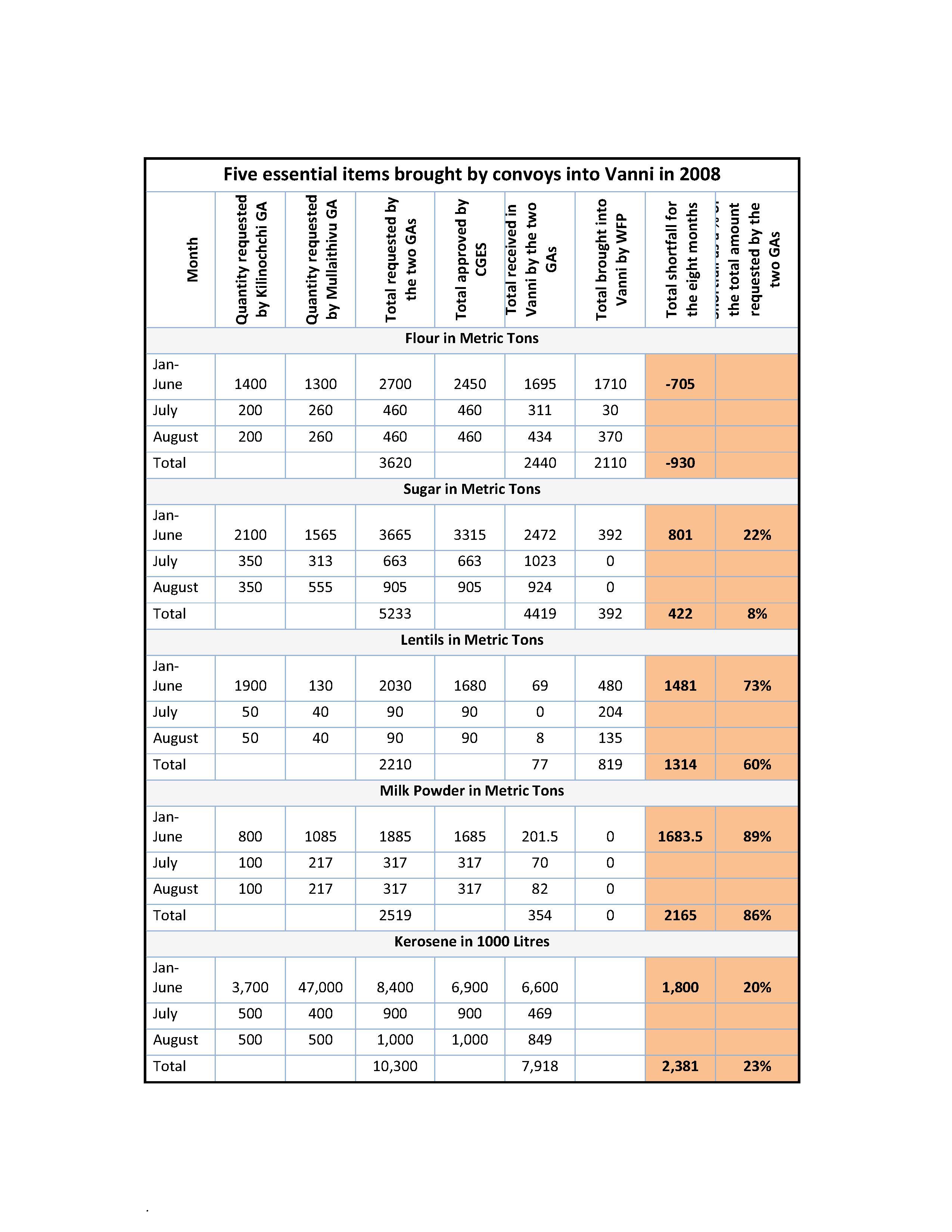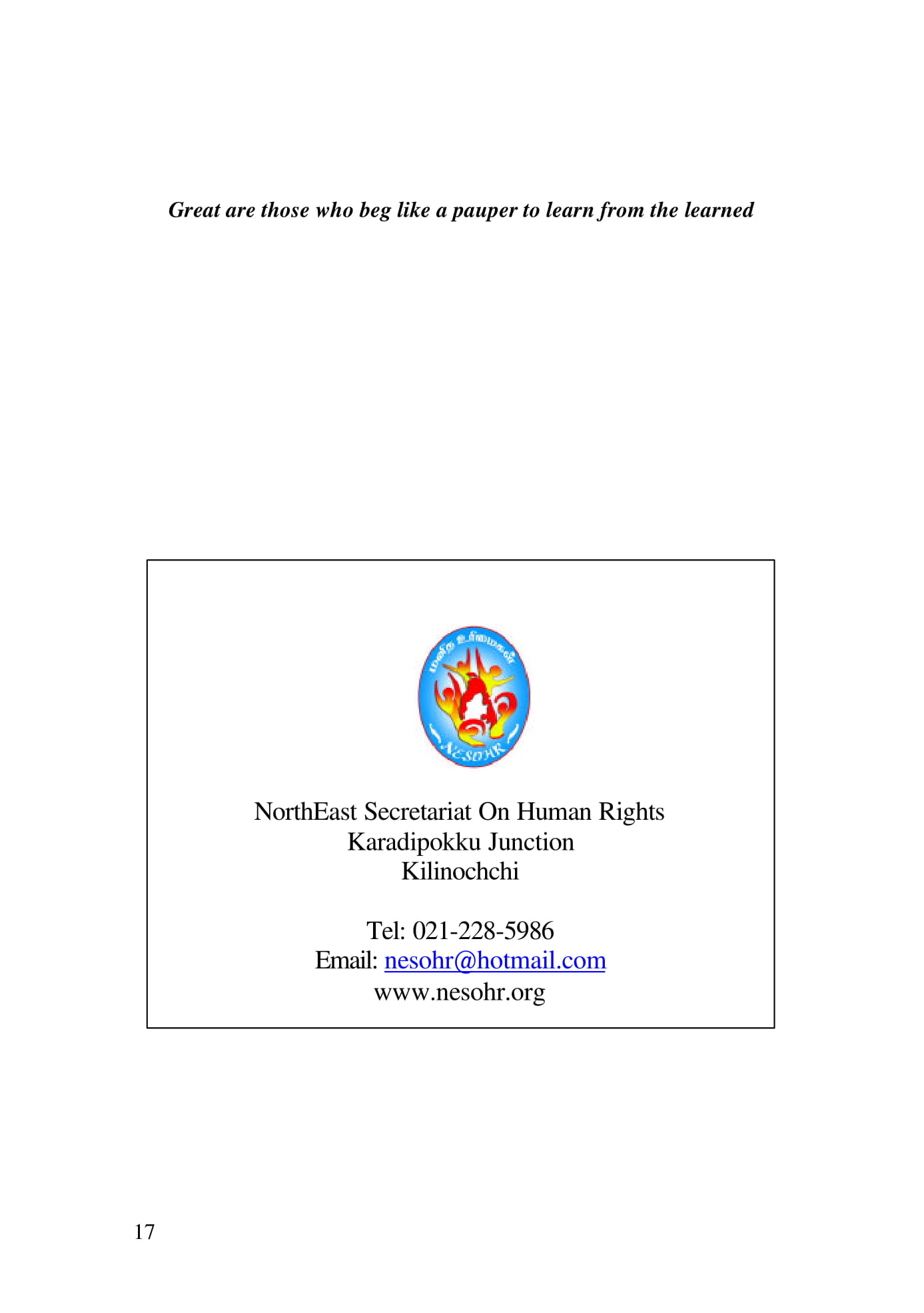Consequences of expelling International Humanitarian Agencies from Vanni – 12th September 2008.
‘’we do not need international agencies to provide humanitarian aid, we can do it ourselves. ‘’ These are the words of one of the leading Sri Lankan Government officials who have ordered all international agencies in Vannito keave the area because they are no longer able to guarantee their safety. “ Stocks of food and other essential humanitarian supplies in Vanni are at dangerously low levels.’’ These have been the words of international humanitarian agencies working in Vanni. It is also clear that the people , who are being reffered to in this tug-of-war on humanitarian aid, the Tamil IDPs in Vanni, desperately want the international humanitarian agencies to stay.
Humanitarian supplies
NESoHR has meticulously reported the IDP statistics and the level of humanitarian supplies in Vanni in several recent reports to raise alarm bells. The shortage of essential humanitarian supplies is caused by several types of blockades imposed by the SriLankan Government at the Omanthai checkpoint through which the supplies must reach Vanni. Insisting of permits to bring every items from milk food to medicines, limiting the number of convoys passing items are the various mechanism by which the blockade, is implemented.
The Table below is the update to an earlier Table, published in the third report above, on the amount of five essentials items brought into Vanni by convoys in 2008. The Table below is update with the quantities borughtin during the months of july and August. It clearly shows the role played by the UN agency, world food program (WFP), to improve the supply of some of these essential items- particularly the supply of lentils that was at dangerously low level prior to August. Indeed, the supplies of some items in the Table that are not handled by the UN agency are still dangerously low. For example the supply level of milk powder for the year of 2008 is 86% below the amount requested by the kolinochchi and Mullaithivu Government agents.
International agencies also bring several other life saving items other than those listed in the Table; one which is tarpaulins to put up temporary cover over the IDP families living under trees. The international agencies also provide other assistance the IDPs such as putting shelters for the IDPs with the material available locally. The international agencies have also helped with providing some medicines that have become unavailable in Vanni due to the blockade.
Fuel
Another cruel ban imposed in Vanni is the severe restriction on all type of fuel. Prior to August 2006, Kilinochchi and Mullaithivu districts consumed close to two million litres of diesel, one million litres of petrol, and an unknown large quantity of Kerosine.
After the fuel ban was imposed, the two districts together were allowed just about 15000 litres of diesel, 800 Liters of petro. With this level of restrictions on petrol and diesel being brought into Vanni privately, the only fuel that is permitted is restricted quantity of Kerosene. As the Table below shows, even the reduced amount of kerosene that is requested by the two Government Agents has been allowed in.
The ability of local agencies , facing the type of fuel restriction to help the IDPs is very limited. Provision of drinking water to the IDPs is a life saving work for which fuel is essential. Indeed, the international agencies which were ordered out of Vanni had to also take all the tankers that they were using to supply drinking water to the IDPs.
Eyes of the world
No reports are permitted into Vanni and this ban has been for more than a year. Communication lines have been cut and this limits the news about the actual situation reaching the outside. The phone lines have been cut by the SriLankan Government. Many people who used the dial – up phone lines to communicate through emails have also been cut off as a result. Death and injury caused by serial bombing, shelling and claymore attacks are hardly reported in the outside media because no reporters are permitted in. in over 25 large scale massacres over a period of two years in Vanni scores of civilians including babies and children were killed. The international agencies often visit the site of such atrocities to confirm what is reported locally. Thus, the international agencies, though silent in order to maintain their work in Vanni, are the only outside eyes to what goes on in Vanni.

Give the above scenario, expelling the international humanitarian agencies during an intense conflict phase will further blackout as well as worsen the unfolding human rights and humanitarian crisis in Vanni. It is therefore imperative that the international community demand their presence and their safety in vanni to Avoid a Human rights and humanitarian catastrophe.
